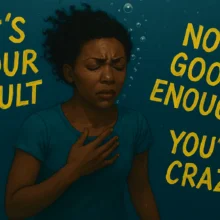Hard to Forgive Yourself? This One Shift Set’s You Free

“Why is it so hard to forgive myself?” Have you ever found yourself lying awake at night, caught in a mental movie reel of a past mistake? You can almost feel the weight of it, a heaviness in your chest, as you ask that same question over and over.
If you’re reading this, it’s likely because you know the profound pain of it being hard to forgive yourself, and a part of you knows there has to be a way out of this prison of guilt and shame. You’ve probably been told to “just let it go,” but that’s like telling someone in a labyrinth to “just find the exit.” It’s not helpful because it doesn’t give you the map.
Imagine for a moment, however, what it would feel like to wake up tomorrow without that weight. To think about your past not with a cringe of regret, but with a calm sense of distance. This isn’t a fantasy. In fact, it’s a skill. This guide is the map you’ve been looking for. We’re not just going to talk about forgiveness; we’re going to walk the path to genuine mental well-being together.
Why Is Forgiving Yourself So Much Harder Than Forgiving Others?
It’s a strange paradox, isn’t it? You can extend compassion to a friend for the exact same mistake that makes it so hard to forgive yourself. Have you ever stopped to notice the difference in how you process those two events?
When you forgive someone else, for instance, you are the observer. You see their story from the outside. But when it comes to your own past mistakes, you become the main character in a horror film that your own mind directs, produces, and plays on a loop. You are fused with the story.
The secret isn’t learning to be a “nicer” director. Ultimately, the secret is realizing you can step out of the theater entirely.
The 3 Hidden Locks That Make It Hard to Forgive Yourself
When you think about that one thing that makes it impossible to move on, you’re not wrestling with a single problem. Instead, you’re wrestling with one of three hidden locks. As you read these, notice which one resonates most deeply with your own struggle.
1. The Prison of Unchangeable Consequences
This is the biggest reason it’s hard to forgive myself for so many people. You can’t move on because you are still living with the fallout. Forgiveness feels like a lie because the evidence of your failure is all around you.
“My grown children are a mess. I know it’s because of choices I made as they were growing up. Even though I truly found Christ and am born again but it’s hard to get over the guilt. It is sometimes paralyzing to me. I don’t know what to do.”
Because you cannot turn back time and “fix it,” a part of your mind believes that suffering is the only appropriate response. And as long as you believe that, it will be true for you.
The past is a story. It’s time to pick up the pen.
💡 Click Here to Heal & Rewrite Your History.
2. The Pride of a “Perfect” Past
This is a subtle trap of the inner critic. Listen closely to that inner voice. Does it sound something like, “I should have known better”? In truth, this isn’t humility; it’s a form of spiritual pride. You are unconsciously making your mistake so uniquely terrible that it’s beyond grace. By holding onto the shame, you are making your judgment more important than any possibility of redemption.
3. The Ghost of a Former Self
This happens when you fuse your identity with your actions. The mistake is not something you did; it is who you are.
“The older I get the more I realize how much of a sinner I am. I am soooo disappointed with myself. I need to watch this video.”
Think about this: That person who made the mistake doesn’t exist anymore. They were a collection of thoughts, beliefs, and awareness that has since changed. Punishing your present self for the actions of a person who no longer exists is a profound act of self-blame. Doesn’t it make you wonder what might happen if you decided to finally let that ghost rest?
How to Begin the Process When It’s Hard to Forgive Yourself

Let’s move from theory to action. True self-forgiveness is a practical skill. As you read the following steps, imagine yourself actually doing them.
Step 1: The Sovereign Audit (Create a New Perspective)
This first exercise is designed to create objective distance and change your internal representation of the event.
- Column 1: The Security Camera Report. In a journal, write down what happened as if you were a neutral camera recording data. Avoid emotion and judgment. For example: “At 10:15 PM, words were spoken at a high volume.” “The financial decision was made.”
- Column 2: The Internal Weather Report. Now, list the feelings and beliefs you are experiencing today. For example: Guilt. Shame. Resentment. The belief I am a bad person.
Look at the two lists. Notice how Column 1 is fixed in the past, while Column 2 is happening now, inside of you. This means you have power over it. The past is not controlling you; your current reaction to the past is. And because it’s your reaction, you can choose a new one.
Step 2: The Transmutation Ritual (A Conversation with Your Past)
Your negative emotions are simply energy tied to a memory. Consequently, this ritual helps you reclaim that energy.
- Find a quiet space and close your eyes. Allow yourself to feel the guilt or shame from your list. Where is it in your body? Just notice it.
- Imagine your past self—the one who made the mistake—standing before you. See them at the age they were, with the knowledge they had then.
- Now, speak to them from your wiser, present-day self. Say these words, and as you say them, notice the subtle shifts inside you:
- “I see you, and I understand you were acting from your level of awareness at the time.”
- “I have been punishing you for a long time, and I am choosing to stop now.”
- “Thank you for the painful but powerful lesson this has brought into my life.”
- “I release you from this story. You are free. And I am free.”
This isn’t just an intellectual exercise. It is, in fact, an act of intrapersonal communication that tells your subconscious mind that the war is over.
Step 3: The Declaration of a New Timeline (Programming Your Future)
The inner critic has been running a negative program for years. Therefore, it’s time to install a new one with a more powerful command. Repeat one of these declarations daily.
- “I am resourceful enough to handle the consequences of my past with wisdom and grace.”
- “Every day, I am finding it easier and easier to release the past.”
- “My future is a clean slate, and I am the one who writes on it.”
Your Questions For When It’s Hard to Forgive Yourself
These are the unique questions that arise when you get stuck in the labyrinth. Let’s shine a light on them.
Q1: What are the 4 R’s of self-forgiveness?
This is a popular model. Let’s install it with a more empowering frame:
- Responsibility: Acknowledge your role without accepting the label of “bad person.”
- Remorse: Feel the clean pain of misalignment, which fuels your desire to evolve.
- Restoration: Make amends where possible. Where you can’t, the ultimate restoration is to become the person who never makes that mistake again.
- Renewal: Realize you can now learn from the experience without being defined by it.
Q2: Will God forgive me if it’s hard for me to forgive myself?
A profound paradox. Consider this: what if divine forgiveness is like the sun, a constant source of light? When it’s hard to forgive yourself, you are simply holding up an umbrella of self-blame. The sun is still shining, but you are blocking yourself from feeling it. The moment you decide to lower the umbrella, you will feel the warmth that has been there all along.
Q3: How do I forgive myself for intrusive thoughts?
Realize this now: You are not your thoughts. An intrusive thought is like a pop-up ad from your subconscious. You “sin” against yourself only when you believe the thought defines you. For this reason, the path to freedom is to become the observer. When the thought appears, simply say, “That is a thought,” and let it pass. You’ll be surprised how quickly it fades when you stop fighting it.
Q4: How can I release resentment and shame from my body?
These feelings are stored energy in your body, so you need to move them out.
- Somatic Shaking: Stand up and shake your body vigorously for 60 seconds. Animals do this to release trauma. This action tells your nervous system to let go of the stored energy.
- Powerful Exhalation: Take a deep breath in. As you exhale, make an audible sigh, “Haaaaaaaa.” Imagine the dense energy of shame leaving with the breath.
Q5: What if I keep making the same mistake?
“My problem is asking for forgiveness so often for the same sins I keep repeating over and over again. I feel like my repentance loses it’s sincerity and worth every time I go back on my promise to God.”
If this is you, you can be glad you’ve recognized you’re dealing with a subconscious program, not a failure of willpower. It is exceptionally hard to forgive yourself when you’re stuck in a loop. So, instead of feeling guilty, get curious. Before the pattern repeats, ask: “What am I about to get from doing this?” Usually, the answer is a temporary escape from an uncomfortable feeling. Once you know what you’re trying to escape, you can begin to find a healthier way to meet that need.
The Real Takeaway: Forgiveness Is a Decision You Make Today
Ultimately, feeling that it’s hard to forgive yourself is not a life sentence; it’s a symptom of a broken strategy. True forgiveness is not a feeling you wait for. It is a sovereign decision you make right now.
It is the decision to stop sending your life force back in time to a moment you cannot change.
Furthermore, it is the decision to stop allowing a memory to dictate your identity.
Finally, it is the decision that your potential for personal growth is more important than your attachment to guilt.
You can’t change the past, but the story you tell yourself about it? That, you can change completely. And when you change the story, you change everything. What new story will you decide to write, starting now?
The past is a story. It’s time to pick up the pen.
💡 Click Here to Heal & Rewrite Your History.
✅Signal Note: Some links on this page are affiliate links. That means if you choose to purchase through them, I may earn a small commission—at no extra cost to you. I only share tools and frequencies I’ve personally tested in the loop. No nonsense. No false light. Just signal.



